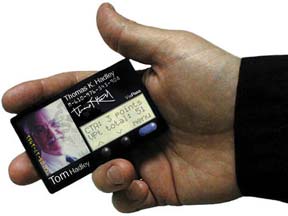
The now famous BusinessWeek cover story of October 16, 2000, gave a thorough examination of why Chicago was no longer the economic center that it had been in the middle of the 20th century. The article was called 'Chicago Blues,' and detailed the city's failure to capitalize fully on the '90's economic boom. But on the computer screen of Institute of Design graduate student Jeff Ettenhofer ('01), the magazine's cover has been artfully altered using Photoshop to read, 'Chicago Rules.'
Ettenhofer and four of his ID classmates, Joanna Barth, Matt Beebe, Tim Murphy, and Jeff Tull, teamed up during the 2000-2001 school year to bring their design skills to bear on one facet of Chicago’s regional economic problem: transportation. They worked under the advisement of Chicago Metropolis 2020, a not-for-profit group initiated by the Commercial Club of Chicago that seeks to ensure the preeminence of the region by addressing a broad range of vital issues, including transportation. Over the course of the year, the students designed a system of interlocking products, services and business concepts that would shift individual behavior in ways that reduce congestion and benefit the larger community.
‘One of the reasons I came to ID was the prospect of solving large-scale problems and making a real difference in the world,’ said Ettenhofer. ‘Regional transportation seemed like a really hot topic with the potential to affect a lot of people.’
Among the students’ broad range of ‘solution elements’ (concepts for products, services, and processes that make up the system) were: Progress Points, an artificial currency that rewards commuters for choices that reduce congestion, like driving at off-peak times; Working Lots, a new venture concept that transforms ordinary parking lots into delivery centers for groceries, dry cleaning, and other goods and services that currently necessitate an inordinate amount of congestion-causing trips; and Regional Decision Center, a high-tech meeting space that enables regional planners and decision-makers to work more efficiently toward transit solutions that satisfy common regional goals.
Over the course of the school year, the student team, who called themselves TransitLab and their project ViaChicago, received ongoing feedback on their ideas from Metropolis 2020’s leaders and other civic officials. The team’s relationship with the not-for-profit group proved to be one of the most valuable parts of the project.
‘Metro 2020’s goals, and the people they know, are really interesting,’ said Ettenhofer. ‘Mayors, transportation planners—people who help structure our entire society. Their influence is huge. Regularly presenting our ideas to such an influential group forced us to think even harder about them and really get our story straight.’ The team presented their evolving ideas to Metro 2020 several times over the course of the year, culminating in a final presentation to a group of transportation officials and regional mayors in the spring.
After the regular school year, Ettenhofer and teammate Matt Beebe continued in a summer internship for Chicago Metropolis 2020 on a different topic: visualizing on paper the complex network of not-for-profit groups that share Metro 2020’s interests. After surveying the various groups and describing them in a standardized way, the designers created a detailed, poster-sized chart showing the web of relationships. Metro 2020 officials plan to unveil this document to other members of the network and to funding agencies, using it as a tool for developing more effective forms of collaboration.
Although the TransitLab team graduated from ID in the spring of 2001, other ID students are continuing to work on projects under Metro 2020 advisement. This year, a new student team is focusing on the issue of land development and affordable housing, which is another of Metro 2020’s primary goals.
‘Observation of real people is the basis of (projects like these),’ says TransitLab advisor Greg Prygrocki, associate professor at the Institute of Design. ‘Deep involvement with an outside institution gives students clearance to ask questions and get feedback that they wouldn’t otherwise have.’